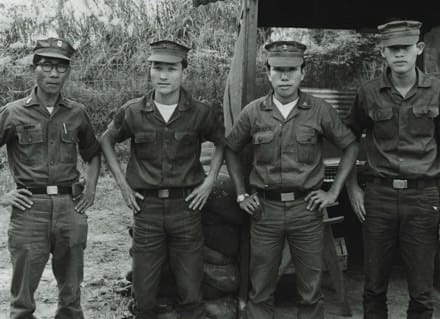I love military history and in particular SOF and SI history, having served in both communities. I especially appreciate the MI stuff since so little has been published. The US Army’s Military Intelligence Soldier Heritage Learning Center recently shared this post:

Photo: Personnel of the 1st ASTD, one of the ARVN units supported by the DARRS detachments
On 31 July 1970, the Army Security Agency (ASA) established Division Advisors Radio Research Support (DARRS) Detachments in South Vietnam. The DARRS detachments were an effort to further the overall “Vietnamization” of the war as well as provide direct support to the American advisors with Army of Republic of Vietnam (ARVN) divisions.
In early 1969, President Richard Nixon’s administration began a program to end American involvement in Vietnam, which involved expanding, equipping, and training South Vietnamese military forces so they could take an increased combat role while reducing the number of American forces. As part of this broader program, the ARVN began to organize their SIGINT effort. To support their divisions, they organized ARVN Special Technical Detachments (ASTDs) consisting of four officers and fifty-six enlisted personnel. Modeled on the ASA’s highly successful direct support units attached to American divisions and separate brigades, the ASTDs provided SIGINT support to combat divisions and passed information up the South Vietnamese cryptologic chain of command. On 1 July 1969, two ARVN divisions received the first ASTDs.
Under the terms of the Vietnamese Improvement and Modernization Program, ASA’s 509th Radio Research (RR) Group, under Col. William W. Higgins, would assist the ASTDs by providing mission equipment and logistical support and by instructing the South Vietnamese on how to perform their own maintenance. All the while, ASA leaders continued to take every opportunity to press the ARVN to focus upon voice intercept and even offered on-the-job training by temporarily assigning Vietnamese to the 509th RR Group’s own low-level voice intercept teams.
Over the next year, Higgins and his group informally supported the ARVN’s nascent SIGINT efforts. Under Project SCREWDRIVER, 509th RR soldiers regularly visited South Vietnamese elements to pass on maintenance tips and to ensure they were receiving necessary supplies. These visits also proved an excellent means to monitor overall operational progress.
At the same time, intelligence support for American advisors became more critical. Consequently, the 509th RR Group field-tested the concept of a team dedicated to specifically support the senior American advisor for the 1st ARVN Division. This test proved so successful that the U.S. Military Assistance Command, Vietnam (MACV) approved the concept for all of the ASTDs. On 31 July 1970, MACV and ASA established the DARRS detachments.
The DARRS detachments’ primary function was to pass SIGINT information to senior American personnel advising the South Vietnamese divisions and to provide a sanitized version for the ARVN commanders. In addition, DARRS personnel provided the ASTDs with constant support and advice. Their impact was immediately evident and began to assure that the ARVN detachments were operationally functional.
As one advisor noted, “For a long time we had a shortage of hard intelligence…The 9th DARRS has given us the ability to make estimates and allow the commander to make decisions.”
?Michael E. Bigelow

